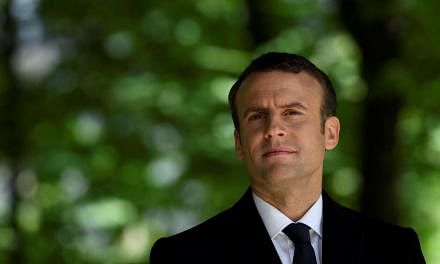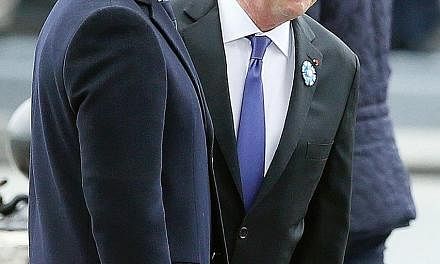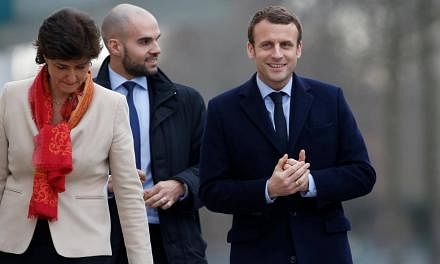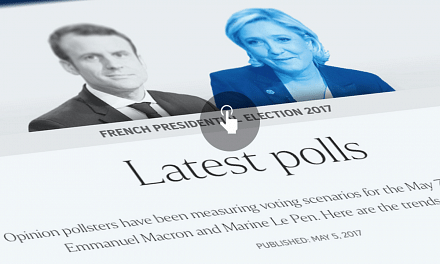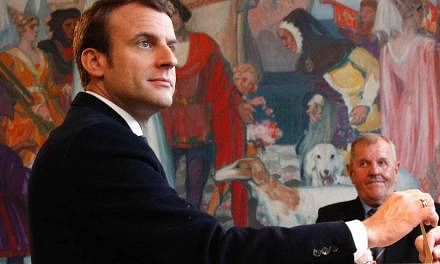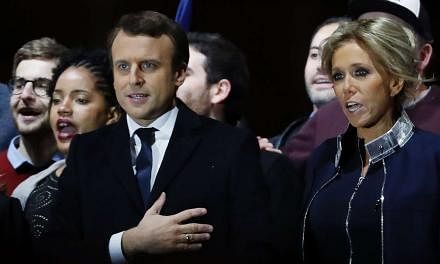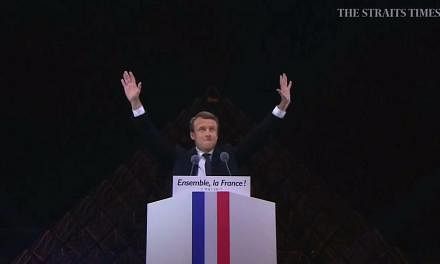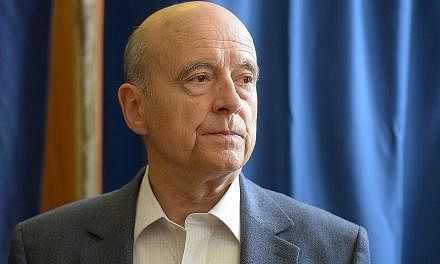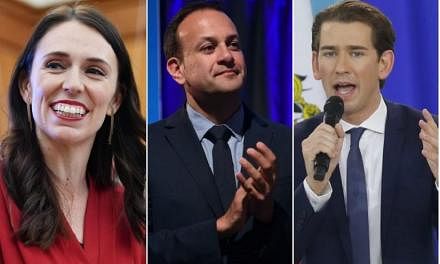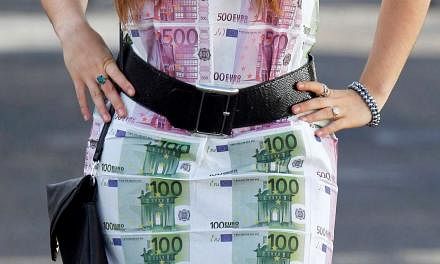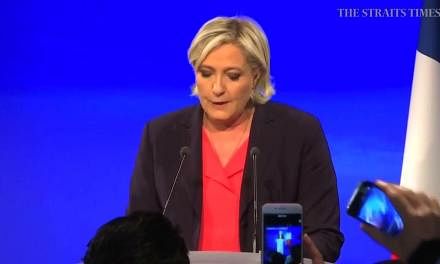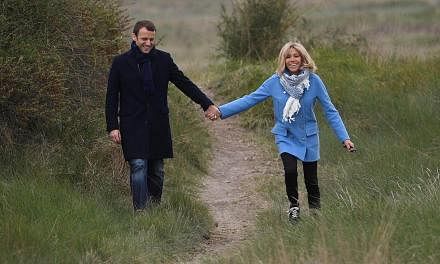PARIS - On Sunday (April 23), the French go to the polls to choose two candidates from a field of contenders in the presidential race who will go through to a run- off two weeks later on May 7.
The election is one of the most unpredictable in modern French history, as a groundswell of anti-establishment feeling and frustration with France's economic malaise has seen a growing number of voters turn their backs on the mainstream parties.
Opinion polls show one in three voters are still undecided about who to back after a campaign characterised by scandals and upsets.
The international community is also watching the race closely to see how far the populist wave has gone, after Britain's surprise vote to exit from the European Union and Donald Trump's election as US president.
Here's what to know about the candidates and the various scenarios:
THE KEY CANDIDATES
There are 11 candidates in total and the top four, based on opinion polls, are as follows:
Centrist Emmanuel Macron, 39
En Marche! (Onwards!)

The former investment banker and former economy minister is the youngest candidate and the only one with no experience in running a campaign. But Macron has emerged as a favourite to win the election and has seen solid poll gains over the last month after performing well in television debates.
After leaving Rothschild, he joined President Francois Hollande's government in 2012 and it was not long before he became economy minister. But he resigned in August 2016, criticising sacred cows of the "social model" such as the 35-hour working week, iron-clad job protection and jobs-for-life in the civil service. These are messages that have made him one of France's most popular politicians, a big achievement for an ex-banker in a country where many disdain the world of high finance, though he remains mistrusted by many on the traditional left.
Macron setup the "En Marche!" or "Onwards!" political movement in April and many critics saw him as, at best, a shooting star of limited life span. But with the Socialists in disarray and the centre-right's candidate Francois Fillon mired in a financial scandal, Macron soon emerged in pole position.
Tapping into disenchantment with the status quo, Macron has vowed to shake up the establishment. "France is blocked by the self-serving tendencies of its elite," he once told supporters at a rally in Pau town. "And I'll tell you a little secret: I know it, I was part of it."
Macron is seen as having the best political programme, according to a snap survey. He aims to end nepotism and conflict of interests in politics and modernise the economy, as he seeks to counter criticism that he and his political party are not ready to govern. He also advocates market-oriented economic reforms and wants to renegotiate European Union's treaties, including the one that keeps France in the euro.
He has confounded opponents by building up huge grassroots support and winning endorsements from defecting centre-left and centre-right politicians.
Macron is married to his former teacher Brigitte Trogneux who is 24 years older than him. He has known her since he was 16 years old. Given the big age gap, their marriage has been the stuff of intensive coverage by glossy boulevard magazines. In February, he publicly dismissed rumours that he had a gay relationship outside his marriage.
If elected, Macron will be the youngest French president since Napoleon.
Far-right Marine Le Pen, 48
National Front (FN)

She entered politics when she was 18 by joining the National Front founded by her father, ex-paratrooper Jean-Marie Le Pen. In 1998, she abandoned her law career to provide legal advice to the party and was first elected to political office in 1998 as a regional councillor in northern France. She later had the same role in the Paris region before returning to the northern rust belt in 2010. She has also been a member of the European Parliament since 2004.
Living and breathing politics from her youngest years, Le Pen has said her childhood was deeply marked by the explosion of a bomb that destroyed the family apartment when she was eight years old in an incident that remains unsolved.
She has brought the FN from fringe status into the political spotlight and made herself a real contender to be France's first woman president and its first far-right leader since World War Two. Since taking the helm in 2011, she has sought to rid the party of the anti-semitic image it acquired under the nearly 40-year leadership of her father. The twice-divorced mother of three has positioned the party as an anti-immigrant, Eurosceptic force offering protectionist policies to shelter French workers from globalisation.
Polls have consistently shown Le Pen as one of the favourites to get through the April 23 first round and contest the May 7 runoff. That would be a step further than her first attempt in 2012, when she failed to reach the second round.
With her trademark gravelly voice, Le Pen never hesitates to lock horns with journalists or rivals on televised debates as she takes on the political establishment. Her plans to ditch the euro and force the French central bank to fund state spending remain deeply unorthodox, although she says her economic policies are more in tune with the anti-globalisation sentiment that propelled President Donald Trump to the White House and fuelled Britain's Brexit vote last year.
Le Pen has tried to pursue a softer image even at the expense of her relationship with her father, disowning his comments that Nazi gas chambers were a "detail" of history. She had him expelled from the party over his views in 2015. But she too has shown she can touch a raw nerve, provoking outrage this month when she denied the French state's responsibility in the German-ordered roundup of 13,000 Jews by French police in Paris during World War Two.
Le Pen is also under investigation over the alleged misuse of EU funds to pay party assistants and for tweeting pictures of violence by the Islamic State in Iraq and Syria (ISIS).
Left-wing Jean-Luc Mélenchon, 65
France Unbowed

A former minister who quit the ruling Socialists in 2008, Mélenchon has surged from behind in the final stages of the campaign to become a serious contender for one of the two top spots in the first round of voting. During the last election in 2012, he was also tipped as the "third man" but lost support in the final stages to finish fourth, behind Le Pen.
This time Mélenchon is convinced that he will make it past the first round, buoyed by fury with the mainstream parties and with the EU that he has spent a decade heckling.
He is a member of the European Parliament, but no fan of the direction the bloc has taken. Poverty and poor economic growth, he says, are a result of laissez-faire economics and an allergy to deficit-spending that he blames on Germany.
He says by spending heavily and hiking public sector wages, the French economy will grow faster, knocking the jobless rate from 10 per cent to six per cent by end of term in 2022, buoying tax income for the state and social services.
The left-winger also pledges a rewrite of the Constitution to end what he calls a "presidential monarchy" - shorthand for a radical change that would boost parliamentary power and voter control over a head of state who currently enjoys more power in the country than presidents in many other Western democracies, including the United States.
An acclaimed orator who sprinkles his tirades against the liberal establishment with odes to the arts and philosophy, the razor-tongued Melenchon draws rapturous crowds wherever he goes. He boasts a bigger Youtube following than what US President Donald Trump had during the race to the White House. He uses hologram technology worthy of Star Trek movies to address rallies, usually sporting a hybrid of traditional proletarian jackets, while a virtual-reality Melenchon does the same job at rallies elsewhere.
Centre-right Francois Fillon, 63
The Republicans

The former prime minister started his election campaign on a strong footing, leading the race for several weeks. But his campaign was thrown into chaos in January after a French satirical and investigative newspaper Le Canard Enchaine accused him of paying his British wife Penelope almost a million euros for doing little work, including several years as his parliamentary assistant. Fillon also paid two of their children for work as lawyers when he was a senator between 2005 and 2007
Fillon denied wrongdoing, alleging he was the victim of a government plot to destroy his candidacy by spreading damaging media leaks about him. But he was charged with abuse of public funds.
Despite the setback, Fillon has vowed to pull off a victory that will "surprise the microcosm" arrayed against him. "I can see things clearly. I am absolutely sure I'll be in the second round because there is a strong desire for change in our country and I am the only one proposing serious and reasonable change," he told reporters.
He has cast himself as the man to deliver the "deep transformation, almost a revolution" which he says France needs after years of slow growth under President Hollande. "My plan is the only one radical enough to get us out of the economic rut ...," he said in an op-ed for Les Echos newspaper.
A devout Catholic, Fillon spent Easter weekend wooing his Catholic and conservative base, vowing to take a member of the Sens Commun Catholic movement in his government if he is elected.
THE SCENARIOS
With one in three voters still undecided about who to back, some observers are prepared for a surprise outcome. Here are some possible scenarios:
1. Macron versus Le Pen
Polls have forecast this run-off scenario as the most likely since early February. It would represent a seismic shift in France's political landscape, featuring neither of the mainstream parties that have governed the country for decades, and pitting a man who set up his party just a year ago against a woman who wants to take France out of the European Union.
Seeing Le Pen in the second round could unnerve investors even though they and French voters have had plenty of time to get used to the prospect. Opinion polls forecast that the pro-EU, centrist Macron would win the contest easily, depriving Le Pen of the chance to become France's first woman president.
A Macron presidency would beg the question of whether he can win a majority in the parliamentary elections that follow in June. A Le Pen victory would be much more of a shock, but for her, much would also hang on the June ballot.
2. Fillon versus Le Pen
This was, until late January, seen as the most likely outcome. Now Fillon polls in third, or arguably fourth place, because of the nepotism scandal involving his wife. He has made a modest comeback though, and pollsters see a possible last-minute boost from conservatives who had been put off by the scandal but would eventually balk at putting Macron into the run-off instead of Fillon.
Fillon's margin of victory over Le Pen is seen as the smallest, so investors may find this second-round scenario more chilling than the above pairing. Fillon has denied wrongdoing in the scandal, but it would likely follow him into the presidency, casting doubts over how easily he can push through his already controversial plans for steep spending cuts.
He may, nevertheless, have a smoother run to a parliamentary majority than Macron or Le Pen, given that he has a party structure in his The Republicans grouping.
3. Macron versus Fillon
The big surprise here would be Le Pen's failure to make it to the run-off, confounding years of opinion polls. With Melenchon also not in the second round, both anti-EU contenders would be out - likely a relief for investors.
Opinion polls show Macron beating Fillon easily in the second round. While missing out on the run-off would be certain to create a lot of soul-searching in the FN, experts say Le Pen's grip on the party remains strong. How the FN fares in the parliamentary elections that follow in June would be crucial.
4. Melenchon vs Le Pen
This would be the biggest shock for financial markets, with two populist, anti-EU candidates, to the far-left and far-right of the French political spectrum. Melenchon's surge in polls in the back of strong performances in TV debates late March and early April is the latest surprise in the topsy-turvy campaign. While no opinion polls have so far predicted he would make it to the second round, the 65-year-old is now challenging the pollsters' margins of error.
Opinion polls suggest him beating Le Pen in a second-round match. He too, though, would want to overhaul the EU or pull France out. Also like Le Pen, he would likely struggle to attain a majority in parliament to carry out his plans.
5. Melenchon vs Macron
Polls show Macron easily winning such a run-off, which would pit two very different views of France's future and its relationship with Europe against one another.
SOURCE: REUTERS, AFP, BLOOMBERG , THE STRAITS TIMES ARCHIVES

